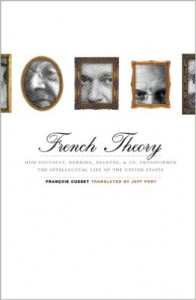
That philosophy died yesterday, since Hegel or Marx, Nietzsche, or Heidegger, and that philosophy should still wander toward the meaning of its death, or that it has always lived knowing itself to be dying; that philosophy died one day, within history, or that it has always fed on its own agony, on the violent way it opens history by opposing itself to nonphilosophy, which is its past and its concern, its death and wellspring; that beyond the death, or dying nature of philosophy, perhaps even because of it, thought still has a future, or even, as is said today, is still entirely to come because of what philosophy has held in store; or more strangely still, that the future itself has a future all these are unanswerable questions. By right of birth, and for one time at least, these are problems put to philosophy as problems philosophy cannot resolve.
–Jacques Derrida, Writing and Difference
This book was one of the things that brought (UPDATE: Girard biographer Cynthia Haven insists it “launched” not just “brought”) deconstruction to the United States. Some of you might not know that one of the papers in this book was delivered at a conference at Johns Hopkins organized by the Catholic thinker Rene Girard in the late 60’s. The conference was the first time American academia was exposed to deconstructive thinking in person. Therefore, Girard bears some brunt of the blame for weak readings of deconstruction ruining the humanities in this country for two or three decades (Ouch!). There’s even a great book by Andrew McKenna, Violence and Difference: Girard, Derrida, and Deconstruction, about how Girard’s Christian anthropology poses the same questions about violence as Derrida, but has much better answers.
 Now, I’ll be first to admit that the title of this post is going to take a little unpacking.
Now, I’ll be first to admit that the title of this post is going to take a little unpacking.
It refers to an interview in which Bob Woodward–that Bob Woodward, the Watergate Bob Woodward–went in to investigate if there’s anything in the Donald’s head. The results were inconclusive.
Bob Woodward: [The Republican party] is the party of Lincoln and the party of Nixon. . . . And so we have this party that you are running to be the nominee in, and it’s got two heritages. Lincoln and Nixon.
Donald Trump: That’s true. That’s true.
BW: And why did Lincoln succeed? Thought about that at all?
DT: Well, I think Lincoln succeeded for numerous reasons. He was a man who was of great intelligence, which most presidents would be. But he was a man of great intelligence, but he was also a man that did something that was a very vital thing to do at that time. Ten years before or 20 years before, what he was doing would never have even been thought possible. So he did something that was a very important thing to do, and especially at that time. And Nixon failed, I think to a certain extent, because of his personality. You know? It was just that personality. Very severe, very exclusive. In other words, people couldn’t come in. And people didn’t like him. I mean, people didn’t like him.
The Donald makes a great point. It is so great you wonder whether even five or ten years ago even he could’ve have made this point himself! That’s what’s so great abut his point. To summarize: GREAT, great point.
It is so great it reminds me of the great, great, great Jacques Derrida (a theologian manque). The Trumpian prose looks and sounds familiar to anyone who’s been exposed to deconstruction. Derrida was a truly great scholar, who even engaged the Catholic theological tradition toward the end of his life, but some of the things he said really, really, really, really, really, really, sound like Trump. Like here, where Derrida is talking about the future:
https://www.youtube.com/watch?v=RgLDHbF3lr0
Isn’t the similarity to Trump’s circular talk about possibilities uncanny? By the way, Freud brought the word uncanny into the philosophical canon. One of the few interesting things I learned from Hans Küng’s bloated Does God Exist? An Answer for Today is that Freud had a Catholic nanny who used to sneak him out to Mass all the time. No wonder his version of psychoanalysis is a secularized version of confession.
I have some more water cooler deconstruction knowledge for you. Did you know that Dick Cheney’s wife Lynne is something of an expert on deconstructionst Michel Foucault’s thought? The blurb for her book, Telling the Truth, doesn’t give any indication of how much she leans on Foucault as a strategy for winning the culture wars:
Challenging the rhetoric of multiculturalism, radical feminism, critical race theory, and other popular trends, Lynne Cheney calls for the restoration of truth and reason to a central place in our lives. In Telling the Truth, Cheney gives us a detailed examination of American cultural and political institutions, journalism, and education. She shows how a disdain for objective truth and principles has created a moral and intellectual crisis that threatens the foundation of America’s legal, political, and social order.
However, the chapter “From Truth to Transformation” is a reading of Foucault against his left-wing-activist American proponents.
Finally, there’s the man who inspired Derrida’s articulation of deconstruction with his call for a destruktion–the word is intentionally ambiguous; it means both destruction and reconstruction–of Western philosophy in Being and Time. Yes, that man is Martin Heidegger, a former seminarian and a bad Catholic all his life.
I’m out of surprises for now, but who knows what the future will bring?
For more insider knowledge on Derrida & Co. see: Derrida and Theology + Phenomenology as Catholic Philosophy = The French Theological Turn
Stay in touch! Like Cosmos the in Lost on Facebook:
Please also consider making a donation to this blog through the donation button on the upper right side of its homepage.












